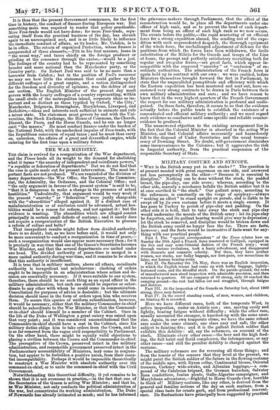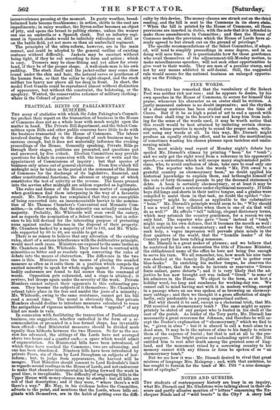MILITARY COSTUME AND SYNCOPE.
"Wiry is the British army put in the stocks ? " The question is at present mooted with great eagerness on one side, and answered not less peremptorily on the other—" Because it is essential to discipline." Nothing can be done without the stock, the padded breast, the pipe-clay, one side avers ; whereas, according to the other side, scarcely a mischance befalls the British soldier but it is at once ascribed to "the stock." Our gallant army, according to the reformers, is constantly on the verge of apoplexy—always "making an effort" to stand upright on parade, and is liable to be swept off by its own costume before it meets a single enemy. It has gone to Turkey to perish of pipe-clay and padding. On the other side it is held, that to take away the stock and pipe-clay would undermine the morale of the British army : let its pipe-clay be forgotten, and its gallant bearing would give way to depression ; let the stock be removed, and discipline would be broken down and the British army could no longer face the foe. There are facts, however ; and the facts would be instructive if facts went for any- thing with our practical people. Fact I. The "special correspondent" of the Tunes relates how on Sunday the 30th April a French force mustered at Gallipoli, equipped in the free and easy semi-Oriental fashion of the French army ; went through various evolutions, took a hasty refreshment, and disappeared with dramatic and romantic celerity. But then, they have neither women, nor stocks, nor bulky baggage, nor foot-pans, nor mouselines de lain; nor human bearing-reins.
Fact II. On Saturday the 7th May, there was an English inspection, to which the English troops had come up with bulky baggage, tightly- buttoned coats, and the dreadful stock. On the parade-ground, the rows of manufactured men stood inspection with admirable precision, and then returned to quarters. Of one company. of 90 strong, only 20 reached the camping ground—the rest had fallen out and straggled, through fatigue and distress.
Fact III. At the inspection of the Guards on Saturday last, about 1000 strong, three men fainted. Fact IV. In the crowd standing round, of men, women, and children, no fainting-fit is recorded.
Here we have different races, both of the temperate West, in active inspection, under an Asiatic sun ; one, moving easily and lightly, bearing fatigue without difficulty ; while the other race, usually accounted the stronger, is knocked-up with the same exer- cise. Again, in our own temperate clime, we have the same robust race under the same climate, one class easy and safe, the other subject to fainting-fits; and it is the gallant British soldier that exhibits this debility : all, say the reformers, on account of the stock. Eliminate every other cause—the beer and the high feed- ing, the full habit and florid complexion, the intemperance, or any other cause—and still the peculiar debility is charged against the costume.
The military reformers are for reversing all these things ; and from the tenour of the censure that they level at the present, we might paint the British soldier of the future in the flowing costume of the middle ages, with Byron collar, Continental blouse, Oriental trousers, Cockney wide-awake, and Albanian leggings,—a com- pound of the Calabrian brigand, the German burschen, Salvator Rosa condottiere, Ionian pirate, Gallo-Algerine campaigner, and Marylebone adventurer,—frightful to Horse Guards -view, horrible to think of! Military costume, like any other, is derived from the
general and familiar notions of the day on such matters, from a special class taste for ornate garb, and from professional conveni- ence. Its fluctuations have principally been suggested by practical inconveniences pressing at the moment. In gusty weather, broad- brimmed hats become troublesome; in action, skirts to the coat are impediments ; in rainy weather, the Byron collar becomes an object of pity, and opens the breast to pelting storms, unless the wearer can use an umbrella or a Spanish cloak. But an infantry regi- ment in Spanish cloaks would be infinitely ridiculous on drill or on the battle-field, yet not more so than an umbrella'd regiment. The principles of the ultra-reform, however, are in the main correct, and could be adapted to the general outline of existing costume without difficulty. Jackets may be succinct without being tight, if they be cut according to form and action ; which is easy. Trousers may be close-fitting and yet allow for every bend, if they be of the proper shape. A well-made man is his own padding. The stock itself and the jacket-collar may come close round under the chin and hair, the natural eaves or penthouse of the human form, so that the collar be right-shaped, and the stock neither too heavy nor above all too deep in front. In short, the model Foot Guards could be reproduced almost without distinction of appearance, but without the constraint, the bolstering, or the apoplexy. Wanted, the conservative reformer of military clothing: where is the Colonel of genius?



























 Previous page
Previous page